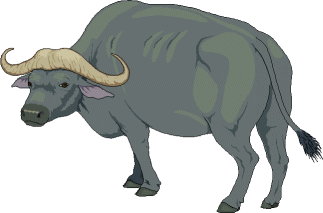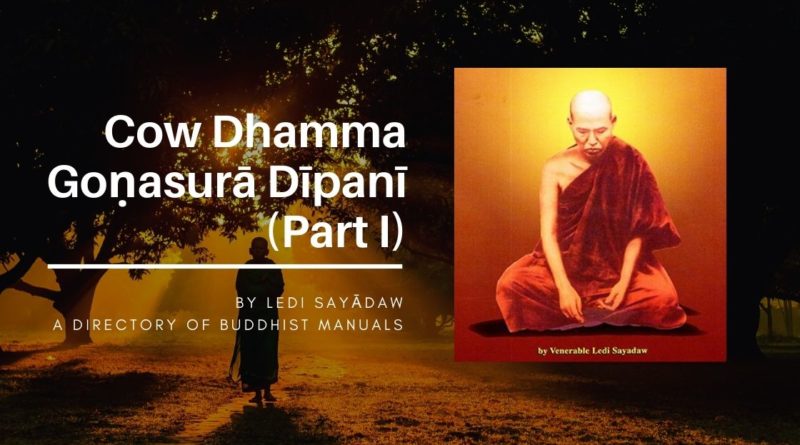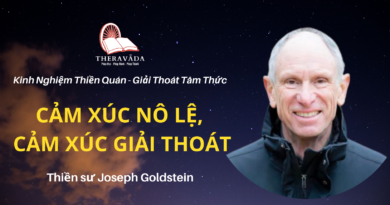Goṇasurā Dīpanī – Editor’s Foreword & Cow Dhamma In Brief – Ledi Sayadaw
MAIN CONTENT
Ledi Sayādaw
Cow Dhamma
Goṇasurā Dīpanī (Part I)
Download the » PDF file (226 K) to print your own booklets.

Contents
Editor’s Foreword
Cow Dhamma in Brief
- Gratitude
Cow Dhamma in Detail
- Comparison of Cows to Parents or Relatives
- Providers of Life, Beauty, Bliss, and Strength
- Deities Protect Good People
- Deities Fail to Protect Ungrateful People
- The Teaching in the Nārada Jātaka
- Morality, Wisdom, and Goodness
- Impracticability of Vegetarianism
- Thirty-Eight Blessings
- Importance of Gratitude
- Love and Compassion
- The End Justifies the Means
- The Power of Lust
- The Blessing of Gratitude
An Appeal For Cows
- Man is Driven by Lust for Meat
- Dumb Animals Cannot Defend Themselves
Editor’s Foreword
This unique work by the late Venerable Ledi Sayādaw puts a strong case for vegetarianism, though the Sayādaw points out that the Buddha did not prohibit the eating of meat by monks. Had the Buddha done this, as Devadatta demanded, it would have caused an obstruction to the propagation of Buddhism wherever meat-eating was common. The overriding consideration for a monk is gratitude and contentment — so if people offer meat or fish he should accept it graciously. He need not eat it, if he does not wish to. If he eats it, reflecting wisely, he will be free from blame.
The Sayādaw stresses that ingratitude is the really harmful factor in eating meat. Beef-eating is especially blameworthy because cattle provide both labour and milk for mankind. Cattle are not used as draught animals in the West, but the practice is still common in Asia. Nevertheless, we do use a lot of dairy products, so the factor of gratitude is important here too.
During the time of the Buddha, the large scale trade in meat would not have been feasible without modern transport and refrigeration. Modern technology has given man unprecedented power over nature, and the consequent growth of ingratitude towards animals, trees, the environment, and material things is obvious. The BSE crisis was a stark reminder of the evil nature of the modern beef-trade. There is no trace of humanity in a system that can feed animal remains to cattle just to increase their body weight for slaughter.
If the Buddhadhamma is rightly understood and practised, people will surely become much more sensitive to the effect that they have on other living beings, and on their environment. The Buddha praised restraint and moderation in all things. He taught his disciples to take proper care of their bowl and robes, to eat almsfood respectfully, to clean and repair their dwellings, and not to damage trees or plants.
A Buddhist monastery or a Buddhist’s home should be a shrine to simplicity, cleanliness, beauty, serenity, harmony, thrift, and self-discipline. Though meat or fish may be taken in moderation, alcohol has no place in the home of a Buddhist. The Āmagandha Sutta, from the Suttanipāta, makes it clear that unwholesome kamma is stench, and not the eating of meat. However, monks have not reflected properly on their almsfood if they look down on vegetarian meals as inferior.
Our debt to cows is immeasurable, even in this modern age. Perhaps we should outlaw the killing of cows as well as the hunting of foxes. It would make for a more caring society.
Bhikkhu Pesala
July 2013
Cow Dhamma in Brief
Namo Tassa Bhagavato Arahato Sammāsambuddhassa
To teach the Dhamma on the virtues of cows, in line with the Sutta Piṭaka, to all the devotees in Upper and Lower Burma, I have translated the Pāḷi Text.
The Brāhmaṇadhammika Sutta from the Suttanipāta (vv 286-317) describes the good conduct of a Brahmin.
- Draught animals, such as cows and buffalos, are likened to the parents of human beings. Because they give service to mankind, they resemble man’s mother and father. In fact they are man’s parents, brothers, sons and daughters. The Buddha declares them to be man’s own relatives.
- Human beings depend on the labour of cows and buffalos for food. With the service of these animals man sustains his life. Since agricultural work is done by them they give life, beauty, happiness, and strength to human beings every day. With four great benefits for human beings, their help is inestimable, the Buddha declares.
- When respect is paid to these life-giving animals as parents and relatives, all the good deities look after human beings. The deities regard them as their relatives as they show love to animals. Thus the deities protect them from disease, danger, and calamity. They also protect the cows and buffalos from these dangers. This is the teaching of the Buddha.
- When gratitude, love, and compassion are weak or absent, men use animals for their needs without compunction. They strike or whip them hard, torturing them in various ways. Finally, they kill and eat them.
Due to that ingratitude and unrestrained greed, deities hate human beings because they lack love and compassion. Individual guardian deities hate individuals. Village deities hate villagers. Town deities hate town dwellers. National deities hate nations. As a result they do not look after the welfare of human beings, and fail to protect them. The opportunity is ripe for the work of demons. New diseases, epidemics, and dangers appear among mankind. All sorts of calamities bring disaster to many people. This is the teaching of the Buddha.
The above explanation is based on the Suttanipāta with direct and inferred meanings.
- The Buddha taught in the Nārada Jātaka that, while cows and buffalos may be used for service when they are strong, when they are old and feeble they must be cared for properly. During their working lives they must be well-fed, and treated with love and compassion. They must not be killed when they are no longer useful.
- The Sarabhaṅga Jātaka. Everybody is expected to observe the five moral precepts (not to kill sentient beings, not to steal, not to commit adultery, not to lie, not to take intoxicants and drugs). Every bhikkhu must observe 227 Vinaya rules scrupulously. All Buddhists, by this observance of morality, become pure in body and speech, which is the main function of morality. One becomes a moral person by leading a moral life.
The characteristic of wisdom is the ability to teach others in accordance with the Dhamma as taught by the Buddha. The aim of teaching Dhamma is to develop civility, knowledge, understanding, and wisdom. He who obtains this qualification is called a wise man (paṇḍita). A wise man, who is learned in the texts and able to teach others, obtains wisdom — a necessary factor of a good man.
The characteristics of a good man (sappurisa) include the open acknowledgment of gratitude owed to others, and revering the good qualities of others. This qualification makes one a good person. Besides these two fundamental qualifications, a third one is the need for a soft and gentle mind, or a good heart. These are the basic qualities of a good man.
In the teaching of the Buddha, the Vinaya concerns morality, the Abhidhamma pertains to wisdom, and the Suttanta concerns the qualities of a good person (sappurisa). Thus we can classify three basic aspects of life. However, they may not be coexistent as one would wish them to be. Some individuals may possess morality, but they may lack wisdom and goodness. So they may not be wise persons or good persons. Some persons are wise, but because they lack morality, they are not good. Others are good, but they may lack morality and wisdom. Some possess both morality and wisdom, but they are not good-natured. Some persons are blessed with morality and goodness, but they lack wisdom. Others possess wisdom and goodness, but they do not have morality.
Some people possess all three basic qualifications: morality, wisdom, and goodness. A few individuals lack all three good qualities. Those who possess all three good qualities are very rare.
- The Temiya Jātaka mentions that those who take shelter and sleep under a tree must not break its branches with bad intention. For the tree becomes his best friend, a helper deserving gratitude. If one destroys the branches of the tree, one violates the duty of friendship, harming one’s benefactor. One lacks the basic requirement of a good man. This is the teaching of the Buddha in the Temiya Jātaka.
Breaking branches and felling trees, even with an evil, ungrateful mind, is not the evil deed of killing, because trees are not sentient beings. However, the evil mental state of ingratitude prevails. Hence the transgressor commits an evil deed. To maintain the virtues of a good person, gratitude must be shown even to lifeless things. One must show reverence and respect even to trees, which gives rest, protection, etc. The maintenance of gratitude for all living beings, and even for lifeless things, is too important to ignore. A tree should not be regarded as inferior, because ingratitude is always a serious defect in the eyes of a good person. One must always maintain gratitude because ingratitude means to adopt a wicked person’s attitude. As regards living beings, even more regard must be given to the acknowledgement of gratitude.
- In the Mahābodhi Jātaka (Jā. 528) a heresy known as Khattavijjāvādiṃ is mentioned. This wrong view says that those who take shelter or sleep under a tree may uproot that tree if they derive benefit from doing so. It means the end justifies the means. Since ingratitude is present it expresses a wrong view. This belief acknowledges no indebtedness.
Gratitude
Appreciation of benefit obtained from others is called gratitude (kataññutā). It means acknowledgment of benefits received, or sincere appreciation. Benefits may be obtained from persons or things. There are two classes of benefactors: well-known or high class persons; unknown or low class persons, or beings of low dignity, power, and status.
Most people exaggerate the benefit received from well-known or high class persons. They will acknowledge a benefit of one hundred pounds for one pound, one thousand for one hundred, because the status of their benefactor is high. However, a low class person’s gift or service usually remain undeclared. If the beneficiaries do acknowledge any indebtedness, they seldom tell the whole truth. One thousand pounds benefit is mentioned as only one pound. This is the attitude of wicked or cunning people. They are not good Buddhists.
All sincere persons of good-will acknowledge their gratitude in the following way: the benefit received from well-known persons is a hundredfold whereas that of ordinary persons is a thousandfold. Since they emphasise gratitude, they speak in glowing terms for services received from ordinary people. This is the nature of Bodhisattas and other good persons.
—————————–
Bài viết được trích từ cuốn Goṇasurā Dīpanī – Cow Dhamma, tác giả Tỳ Khưu Ledi Sayadaw
Link cuốn Goṇasurā Dīpanī – Cow Dhamma
Link tải sách ebook Goṇasurā Dīpanī – Cow Dhamma
Link video cuốn Goṇasurā Dīpanī – Cow Dhamma
Link audio cuốn Goṇasurā Dīpanī – Cow Dhamma
Link thư mục tác giả Tỳ Khưu Ledi Sayadaw
Link thư mục ebook Tỳ Khưu Ledi Sayadaw
Link giới thiệu tác giả Tỳ Khưu Ledi Sayadaw
Link tải app mobile Phật Giáo Theravāda








